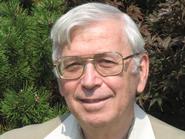
William Lands, a nutritional biochemist who is among the world’s foremost authorities on essential fatty acids, will give a lecture titled “Put Basic Science into Your Personal Health,” on Wednesday, April 16, at 7:30 p.m., in the Chapel. Lands will discuss nutrition, specifically omega three and six fatty acids. The lecture is free and open to the public and sponsored by the Arthur Levitt Public Affairs Center.
Lands spent the majority of his scientific career studying fatty acids and has made many significant contributions to this field. He is credited with discovering the beneficial effects of balancing excess omega-6 fatty acids with dietary omega-3 fatty acids.
Lands was on the biological chemistry faculty of the University of Michigan for 25 years, then headed the Department of Biological Chemistry at the University of Illinois for 10 years. He later became senior scientific advisor to the director of the National Institute on Alcohol Abuse and Alcoholism (NIH). Lands retired from his position at the NIH in 2002. He has authored more than 250 papers and the book, Fish, Omega-3 and Human Health, 2nd Edition, updated in 2005 from the 1985 Fish and Human Health.
While at NIH, he developed a distance learning site for people to learn about his colleagues’ research on the impact of essential fatty acids on health. After retiring he developed a community learning site to learn how 50 years of biomedical knowledge might be turned into “ordinary English” in ways that build a community wellness project in which people would “NIX the 6 and EAT the 3.”
Community dialogue led to developing Omega 3-6 Balance Scores that describe with a single number the balance among 11 different essential fatty acids in a food item. The scores give explicit information on the likely impact of a food on a person’s health risk assessment value. It lets individuals practice primary prevention of a major imbalance that causes so many chronic diseases in America.
